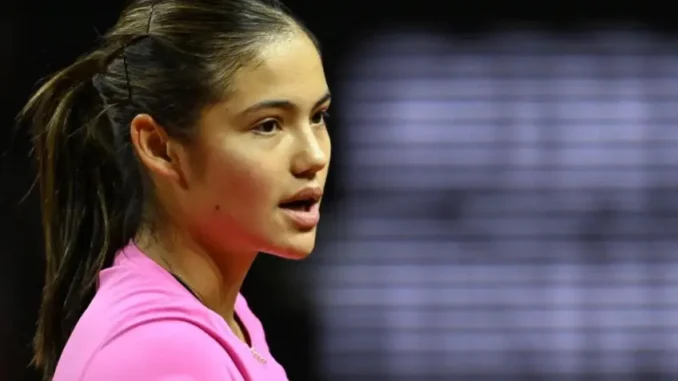
Emma Raducanu, the 22-year-old British tennis prodigy, has never shied away from making tough calls, whether it’s unleashing a blistering forehand or charting her own career path. Her recent decision to withdraw from the 2025 Billie Jean King Cup Finals in Shenzhen, China, in favor of a wildcard entry into the WTA 500 Korea Open in Seoul has sent shockwaves through the tennis world, reportedly leaving the Lawn Tennis Association (LTA) fuming. The move, announced just days before the prestigious team event, underscores Raducanu’s focus on her individual career and her burgeoning partnership with new coach Francisco Roig, but it’s also stirred controversy among those who expected her to lead Great Britain’s charge against Japan in the quarterfinals on September 18.
Raducanu’s journey in 2025 has been one of resilience and reinvention. After a promising grass-court season and a third-round exit at the US Open to Elena Rybakina, the former US Open champion has been working to climb the rankings, currently sitting at No. 36. Her decision to prioritize Seoul over the Billie Jean King Cup, where she was set to be Britain’s linchpin, reflects a strategic choice to defend ranking points from her quarterfinal run at the Korea Open in 2024, which was cut short by a foot injury. That setback kept her sidelined until November last year, when she returned to represent Britain in the same competition. Now, with a relatively clear schedule and no major points to defend, Seoul offers a golden opportunity to gain ground and secure a seeding for the 2026 Australian Open. “Of course we are disappointed,” an LTA spokesperson said, their words barely masking the frustration felt by the organization. “However, we believe we have a great team and we’re looking forward to competing in Shenzhen.”
The Billie Jean King Cup has been a stage where Raducanu has shone brightly, boasting a perfect 5-0 singles record, including three wins during Britain’s semifinal run in 2024. Her absence is a significant blow to captain Anne Keothavong’s squad, which now relies on Katie Boulter, Sonay Kartal, Jodie Burrage, and replacement Francesca Jones to face a formidable Japanese team featuring US Open semifinalist Naomi Osaka. Raducanu’s decision comes on the heels of her absence from the event’s qualifying rounds in April, when she opted for a training block with then-coach Mark Petchey. This pattern of prioritizing individual development over team commitments has sparked debate, with some questioning her loyalty to the LTA, which has supported her since her junior days. Yet, others see her choice as a pragmatic move in a sport where individual rankings dictate opportunities. “It would be easy to criticise Emma Raducanu’s decision to pull out of the Billie Jean King Cup, but to do so would diminish the biggest challenge she has to overcome,” one observer noted, pointing to her need to balance national pride with personal growth.
Raducanu’s partnership with Roig, a seasoned coach who previously worked with Rafael Nadal, has been a key factor in her decision. The collaboration, which began just weeks before the US Open, has already shown promise, with Raducanu refining her slice and overall game. “The PA news agency understands that Raducanu and her team believe she needs to prioritise playing WTA events and spending time on the road with new coach Francisco Roig after a positive start to their partnership,” a report noted. Seoul, where she reached the semifinals in 2022 and quarterfinals in 2024, offers a familiar stage to build on this momentum. The tournament, running from September 15-21, also features heavyweights like Wimbledon champion Iga Swiatek and US Open finalist Amanda Anisimova, promising high-level competition that could sharpen Raducanu’s skills.
The scheduling conflict between the Billie Jean King Cup and WTA events has long been a point of contention in tennis, and Raducanu’s choice highlights the sport’s grueling demands. The International Tennis Federation’s decision to move the Finals to September, hoping to attract top players during the Asian swing, hasn’t fully resolved the issue, as tour events like Seoul continue to compete for attention. Raducanu’s withdrawal is not without precedent; other players have faced similar dilemmas, choosing individual tournaments over national duties. Yet, her decision carries added weight given her vocal enthusiasm for team competition. “I’m training well and hitting well so I’m looking forward to – if I’m picked – seeing how that fairs up in a match,” she said last year before the Finals in Malaga, where her performances were pivotal to Britain’s success.
For British tennis fans, Raducanu’s absence is a bitter pill, especially given her Chinese heritage and the significant fanbase she commands in Shenzhen. Her withdrawal also impacts the event’s marketability, as her star power draws global attention. Meanwhile, Keothavong faces the challenge of rallying her squad without their biggest star, with the winner of the Japan tie set to face either the USA or Kazakhstan in the semifinals. Raducanu, for her part, remains focused on the long game, with upcoming appearances at the WTA 1000 China Open and a clear path to climb the rankings. Her bold move to prioritize Seoul may ruffle feathers, but it reflects a young athlete determined to carve her own path, balancing ambition with the pressures of expectation in a sport that never stops testing her resolve.
Leave a Reply